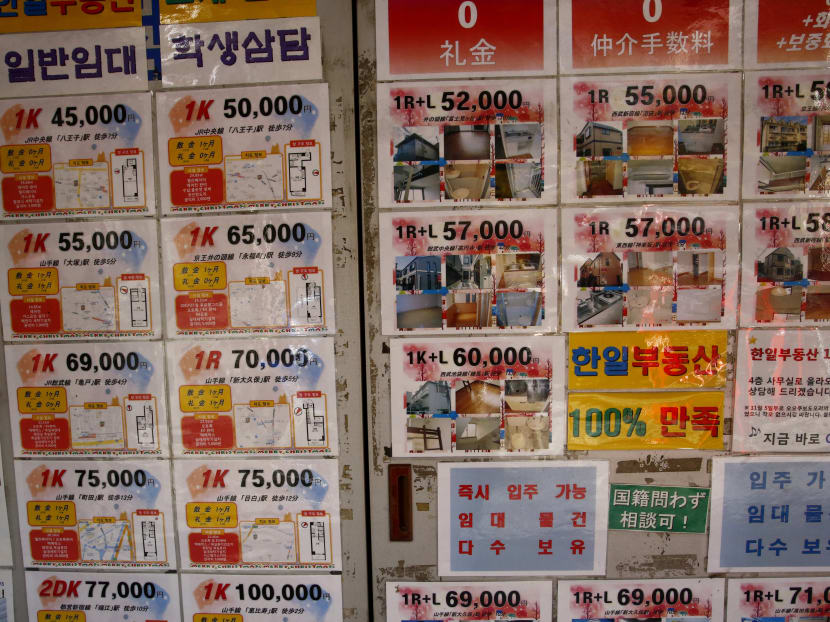A look at Japan’s complex relationship with North Korea
TOKYO — Japan has a troubled and complicated relationship with North Korea. The two countries have no diplomatic ties, but there are tens of thousands of pro-Pyongyang ethnic Koreans who live in Japan and still have relatives in the North.

Real estate agent's advertisements offering apartment rooms, written in Korean, are displayed in front of the agent in Tokyo's Korean district. Photo: AP
TOKYO — Japan has a troubled and complicated relationship with North Korea. The two countries have no diplomatic ties, but there are tens of thousands of pro-Pyongyang ethnic Koreans who live in Japan and still have relatives in the North.
They will likely be the most affected by Japanese sanctions announced yesterday (Feb 10), which include expanded travel restrictions between the two countries and a ban on visits by North Korean ships to Japanese ports. The measures were announced to protest North Korea’s rocket launch, viewed by many as a disguised missile test.
WHY DOES JAPAN HAVE PRO-NORTH KOREA COMMUNITY?
The pro-North Korean community is estimated to account for about a fifth of the half-million ethnic Korean residents in Japan. Most of them are descendants of Koreans who came to Japan during its 1910-45 colonisation of the Korean Peninsula, including those brought here for slave labour at mines and factories in final years of World War II. The Korean communities here are represented by two main groups, one linked to the North and the other to the South.
WHO REPRESENTS THEM?
Since Tokyo and Pyongyang don’t have diplomatic ties, the pro-North Korea group is represented by General Association of the Korean Residents in Japan, or “Chongryong”. which serves as a de-facto embassy. During the postwar period until around the 1990s, some of Japan’s left-leaning politicians had much closer ties to Chongryong than today, some of them even closer than to South Korea’s military government back then. “Chongryon operates banks and dozens of schools across the country, as well as “pachinko” pinball parlours, trading companies to real estate firms, earning foreign currency for the communist North. Many of them have gone bankrupt in recent years amid North Korea’s troubled economy and weakening support here.
HOW ARE THEY TREATED?
Koreans were treated as second-class citizens by Japan during its colonial rule, and their descendants born here after World War II, are called “zainichi” — or “Japanese resident” — Koreans. They are still often discriminated against at school, work and daily life. After the war, they were not granted Japanese citizenship. Many have become naturalised Japanese, but about half a million have not, and are officially considered foreigners. Those who obtain South Korean passports can travel to most countries, but those with ties to the North face more difficulties. Travel options on a North Korean passport are limited, so Chongryong-linked Koreans who want to travel or study abroad often switch their allegiance to the South to obtain a passport.
Anti-Korean sentiment has escalated in Japan in recent years as Tokyo’s relations with both Koreas have deteriorated over territorial, historical and other issues. That has triggered a number of anti-Korea books and hate-speech rallies. Public sentiment toward the pro-Pyongyang group is also harsher because of its link to leader Kim Jong-un’s regime and Japanese government’s condemnation on the abduction issue.
WHAT’S THE ABDUCTION ISSUE?
Pyongyang in 2002 acknowledged abducting a dozen Japanese citizens in the 1970s and 1980s, usually from seaside communities, to train North Korean spies. Only five were sent back to Japan after that, but Tokyo suspects others, possibly dozens more, are still in North Korea. Japan says the abductions are a serious human rights violation and must be resolved along with the nuclear threats. Opening the door just a crack to better relations, Pyongyang in 2014 promised to reinvestigate the fates of a dozen Japanese believed to have been abducted by North Korean agents. In return, Japan eased some sanctions that had shut down virtually all trade and most contacts between the countries.
HOW DID THEY TRAVEL BETWEEN JAPAN AND NORTH KOREA?
The Mangyongbong-92, a sleek white ferry that traveled between Niigata and Wonsan on North Korea’s east coast, was long the symbol of a once-considerable transfer of goods, people and cash between the countries, but it was banned by Japan in 2006 over the abduction problem. The ship was a crucial link for ethnic Koreans in Japan to visit the North, with gifts, supplies and cash for their relatives and friends in the poor, reclusive state. The ship, in peak years, was believed to have transported goods and cash worth hundreds of millions of dollars to the North. Trade between Japan and North Korea, which amounted to more than $30 billion in 2003, has since dropped to virtually nothing since 2010. AP






